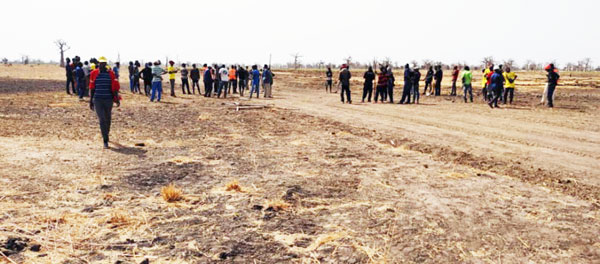“It is difficult to believe that an investor can claim a title to community land”.
The latest events in Ndengler continue to provoke strong reactions, especially since the conflict risks becoming communal. CICODEV and Legs Africa recall that, in the current state of land legislation, no law allows the issuance of land titles on community arable land.
By Dieynaba KANE – “Considering the letter and the intent of the law 64-46 dated June 17, 1964 on the National Domain, it is hardly conceivable that an investor, even a national one, would take advantage of a land title on community lands. This is what the NGOs CICODEV and Legs Africa say in a joint statement. These NGOs deplore “the many conflicts that have led to cases of demolition of houses that communities have spent years building, physical violence against the population leading to serious injuries among the communities. These organizations, which condemn “this protean violence”, call on the State of Senegal, “holder of the public force, to show restraint” and remind it “above all of its constitutional duty to ensure peace and security, and to protect Senegalese citizens in accordance with the Constitution and the international treaties and conventions on human rights to which it is a contracting party”. In their document, these NGOs specify that “in the current state of land legislation, no text allows the establishment of a land title on the arable land belonging to the communities”. Thus, for them, “if the State, the only one invested with the power of registration, must resort to this process, it must only do so for reasons of legally established public utility and after consultation/information with the local populations”.
In addition, these civil society organizations advocate for an evolution of land procedures at the state level. And the organizations explain: “For example, with regard to the mobilization of agricultural land, which is the main source of conflict, there are efforts to be made because the government retains a very legal perspective in the procedure, which does not allow for the total resolution of the problems raised by the land issue, which are also socio-economic, cultural and traditional. Taking this aspect into account, they emphasize that “if we do not promote the social integration process of the populations, we are heading towards more disputes which can be a source of violence/violations”. This leads these organizations to say that “the State must establish a real participatory process with the communities”. In the same context, the authors of the document maintain that it is “urgent for the State to take measures to ensure that communities can fully enjoy their land rights in peace and tranquility. Thus, they recommend: “The institutionalization of citizen control at all levels of land governance in Senegal to ensure the effective participation of the people, the adoption of a ministerial order prohibiting the issuance of land titles on the arable land of local communities in accordance with the presidential directive of December 31, 2020, on agricultural leases in peri-urban areas, it is necessary to develop mechanisms and clauses to return land to the legitimate producers / users of land.” In addition, they propose “the adoption of specific legal mechanisms protecting land rights defenders to enable them to do their work in peace, to update the issue of land reform in its entirety by bringing out the land policy document.” According to these organizations, “this will allow us to move towards concerted solutions, consensual solutions between the families of actors, in order to establish a land governance that will lead to socio-economic development in a peaceful framework that benefits everyone.
Source:www.lequotidien.sn

